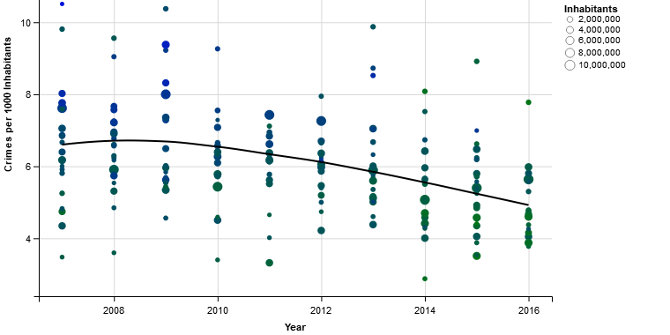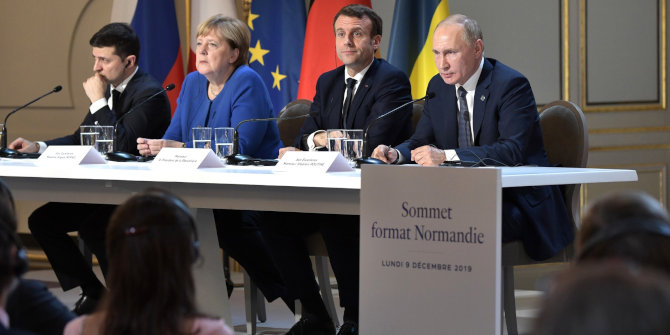Most observers expect Angela Merkel’s CDU/CSU to win Sunday’s federal election in Germany, but the outcome of the vote will still have a major impact on the composition of the next government and the future direction of both Germany and the European Union. We asked four of our contributors for the key stories to watch as the results come in.
- Imke Henkel: While other states slip into the politics of emotion, Germany has showcased the politics of rationality
- Julian Göpffarth: All eyes are now on who will succeed Merkel as CDU leader and chancellor
- Lars Miethke: The foreign ministry remains the major wild card
- Inez von Weitershausen: Forget the talk of another boring victory for Merkel – this is a crucial election for both Germany and Europe
 Imke Henkel: While other states slip into the politics of emotion, Germany has showcased the politics of rationality
Imke Henkel: While other states slip into the politics of emotion, Germany has showcased the politics of rationality
Watching the German election campaign has been fascinating. Contrary to the stereotypical complaint that the campaign has lacked any spark, it has displayed an alternative model of politics. What we have witnessed recently in Britain and in the United States (also up to a point in France) is the politics of emotion. In Germany, what we are witnessing is the politics of rationality.
The German campaign has been called boring because it lacks the escapist entertainment of personal rivalries (such as that between Cameron and Johnson), the nail-biting drama of close opinion polls (as between Clinton and Trump, Leave and Remain, and for some time around Marine Le Pen’s Front National), or outrageously mendacious claims (as in both the British and the US campaigns and also from Le Pen). What we have had instead is a sober TV debate between the chancellor and her challenger that resembled a seminar discussion between two academics rather than a clash between two politicians.
It has become a common trope in German political commentary to call Angela Merkel a politician without convictions or any visionary powers. But pundits overlook that while Merkel’s core belief may be technocratic, it also a reassuring one: the chancellor aims simply for the German people to live comfortably and in safety. As soporific as this may sound, it amounts to the most difficult task for any leader of any state, and indeed sums up what should be the ultimate aspiration of any democracy. The American president, the British prime minister, and the last French president all struggled significantly to achieve it. In contrast, 80 per cent of Germans declare themselves content with their situation. Managerial politics has succeeded.
Yet this overwhelming German contentment only tells one part of the story. There is a different story of a Germany that has one of the largest low-wage sectors in Europe: 23 per cent earn less than £9.30 an hour. OECD figures show that inequality in Germany has increased more than in other industrial states. The country’s strict, austere fiscal policy has produced a budget surplus, but also underinvestment in areas such as education – and it has harmed its European neighbours. Surprisingly, Germans do not appear to be interested in these issues. Merkel’s challenger, Martin Schulz, got nowhere when he tried to address them.
Germany stands on the brink. A rich, broadly well-managed, increasingly powerful country, it demonstrates that rational politics can contain (right-wing) populism. But it still will need to find a way to address its contradictions. The truly riveting spectacle will commence after 24 September: the negotiations to form a new coalition will be obliged to tackle what has so far been kept quiet during the campaign.
Imke Henkel – University of Lincoln
Imke Henkel is a Senior Lecturer in Journalism at the University of Lincoln. She also writes about British politics for Zeit Online. Between 2004 and 2014 she was the London correspondent for the German news magazine Focus. Before that she covered the British economy and British businesses for Süddeutsche Zeitung.
___________________________________________
 Julian Göpffarth: All eyes are now on who will succeed Merkel as CDU leader and chancellor
Julian Göpffarth: All eyes are now on who will succeed Merkel as CDU leader and chancellor
It might seem strange to think about Merkel’s successor when her re-election appears imminent. However, it is certain that Merkel will not run for a fifth term. Her succession is thus likely to be a central question of the next term, but it is still far from clear who in the CDU could follow her into the chancellery.
Two names have been frequently mentioned: Jens Spahn, and Annegret Kramp-Karrenbauer, the successful minister president of the German state of Saarland. Spahn is omnipresent in the media, eloquent and young. At only 37, he is already a member of the CDU’s leadership and represents a new conservatism that supports same sex marriage, but doesn’t shy away from populist stances against Islam, Brussels and cosmopolitan hipsters. He would be a risky choice and a clear break from Merkel’s sober and calm style of politics. Yet, he has the support of influential party factions and Wolfgang Schäuble, the current finance minister and political heavyweight, is one of his biggest fans. Not everyone has taken to his boastful persona, however, and he has proven disloyal to Merkel on several occasions.
Only Kramp-Karrenbauer, aka AKK, has a more influential fanbase inside the CDU than Spahn. Recurrent rumours suggest that Merkel is planning to position her as the party leader in 2018 to prepare her for the chancellery. She is said to be close to Merkel and her success in recent state elections has further strengthened her position. Contrary to Spahn, AKK would stand for a continuation of Merkel – liberal, centrist and quiet, though perhaps too silent as she is still largely unknown. Many Germans cannot even remember, let alone pronounce her last name.
But of course, there are other possible candidates. Current defence minister Ursula von der Leyen has long been seen as ‘the crown princess’, while interior minister Thomas de Maizière has been dubbed the ‘chancellor in reserve’. However, both either have little party-support and/or have had recent struggles to endure. Younger candidates include Julia Klöckner, Daniel Günther and David McAllister. Even if Klöckner lost an important state election last year, she remains one of the CDU’s key young talents and is already well-known. Günther, in contrast, was one of the surprise winners of this year’s state elections, but is still largely unknown. McAllister, on the other hand, is a gifted politician, but lost an important election in lower Saxony in 2013 and has been largely absent from German politics since.
One surprise in this year’s general election campaign has been the comeback of former defence minister Karl-Theodor zu Guttenberg. Although a highly popular and talented individual, he was forced to step down in 2011 when his doctoral thesis was proven to contain plagiarism. Even if he is now a successful consultant in the US, his reappearance on the political scene can be read as a sign of a possible return to the political frontline.
AKK and Spahn might appear to be the main contenders at present, but the ambitions and future possibilities of all of the politicians listed here remain unclear. What is sure is that most are likely to become important political players in the CDU following the election. Even if they fail to become chancellor, they will be the key figures to watch in the coming years.
Julian Göpffarth – LSE
Julian Göpffarth is a PhD candidate at the London School of Economics. He holds a degree in European Studies from Sciences Po Paris and the London School of Economics and Political Science. Prior to his PhD, he worked for the European Parliamentary Research Service. His research interests include nationalist ideologies, radicalisation, European politics and philosophy.
___________________________________________
 Lars Miethke: The foreign ministry remains the major wild card
Lars Miethke: The foreign ministry remains the major wild card
As Germany heads to the polls this weekend, nobody expects Angela Merkel’s CDU/CSU to lose out against her challenger, Martin Schulz. However, the make-up of the next German government is far from a done-deal. Various coalition arrangements are being debated and with them the second most sought-after position in the German government, that of foreign minister. Most of the time, the title comes with that of vice-chancellor and is taken up by the leader of the junior partner in the governing coalition.
Taking the latest polling data into account, four different candidates could potentially become Germany’s next foreign minister. Should the CDU/CSU and the SPD continue their coalition government (they will almost certainly receive the required votes to do so) the SPD would put forward one of two possible candidates. If Schulz manages to improve upon the SPD’s previous election results he will have strengthened his position within the party and would likely take over the role of vice-chancellor and foreign minister from the incumbent, Sigmar Gabriel. Should the SPD lose support though, or only marginally improve upon the last election’s results, Schulz will likely take the blame, resign, and leave Gabriel at the head of the ministry and in charge of coalition negotiations.
Another potential candidate is Christian Lindner, the head of the German liberal party. If he, together with the CDU/CSU, attracts enough votes to join a government (if necessary, maybe with the help of the Green party), he would likely become the next foreign minister. His controversial statement earlier this summer advocating a renewal of the European-Russian relationship despite the illegal annexation of Crimea is indicative of what would be a pro-active ministry that is willing to challenge the next Chancellor on foreign policy.
Less likely, and a true wild card by German standards, would be the nomination of Sahra Wagenknecht. Representing the far-left party, Die Linke, she could theoretically become foreign minister in a cabinet led by Schulz together with the Green party, a potential coalition Schulz has so far declined to rule out. Renouncing German NATO-membership is just one of her party’s policy suggestions for this election, but one that is highly representative of her foreign policy agenda. Ultimately, Germany’s next foreign minister will be determined by the party Germans trust most to cooperate with and challenge the future chancellor – something that will only be known when the results come in.
Lars Miethke – LSE
Lars Miethke is a PhD candidate at the London School of Economics. His research interests include European foreign and defence policies, and the future of sovereignty.
___________________________________________
 Inez von Weitershausen: Forget the talk of another boring victory for Merkel – this is a crucial election for both Germany and Europe
Inez von Weitershausen: Forget the talk of another boring victory for Merkel – this is a crucial election for both Germany and Europe
As the programmes of the mainstream parties show strong similarities in many areas, and as the latest polls suggest that Chancellor of 12-years, Angela Merkel, might lead yet another Grand coalition, one might assume that not much is at stake in this year’s election. Yet this conclusion is not only false, but potentially dangerous as it could lead to a low turnout, which is generally to the advantage of parties at the extremes of the ideological scale.
It is, therefore, crucial to acknowledge that a continuation of the status quo as well as the formation of a new coalition, would have major implications both for Germany and Europe. For instance, a left-leaning government, including another Grand Coalition, may show a higher propensity to “pick up the tab” in the Eurozone, but is also more likely to avoid the structural reforms that are so urgently needed to ensure the longevity of the European integration project.
Similarly, if they were to be returned to office, the ruling parties might have little incentive to address the growing social imbalance which has become a key issue in the country. A failure to reform crucial areas such as pensions, healthcare or education will, however, in the medium to long-run result in growing voter disenchantment and the further rise of parties on the extreme left and right.
Finally, there is a risk that, depending on the outcome of these elections, Germany may appear in the eyes of its partners as an overly self-confident and ever-powerful actor. While a growing role in the world may provide Germany with the ability to shape events in line with its preference for multilateralism and cooperation, it will also expose Berlin to new demands and potential criticism.
On 24 September, the German electorate will, therefore, engage in no less than a Richtungsentscheidung (a decision on the basic direction of the country). Hopes remain that this insight will be reflected in the turnout, support for democratic parties and, subsequently, the commitment of the new government to address the country’s most pressing issues.
Inez von Weitershausen – Massachusetts Institute of Technology
Inez von Weitershausen is a Researcher at the Massachusetts Institute of Technology (MIT). She was formerly a teacher on the LSE100 course and completed her PhD in the LSE’s Department of International Relations. She is also one of the editors of The Brexit Reader on Security & Defence.
Please read our comments policy before commenting.
Note: This article gives the views of the authors, and not the position of EUROPP – European Politics and Policy, nor of the London School of Economics. Featured image credit: Nibe181 (CC BY-NC 2.0)
_________________________________





